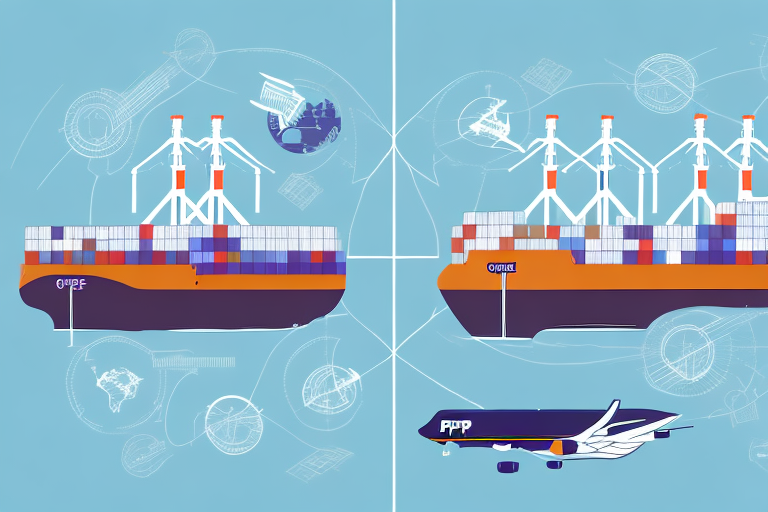Comparing International Shipping Rates: UPS vs FedEx
International shipping is a critical component of modern business operations, enabling companies to reach customers across the globe. Choosing the right carrier is essential to ensure reliability and efficiency. Two of the leading shipping companies in the market are UPS and FedEx. This article provides a comprehensive comparison of their services, focusing on costs, transit times, customs and duties charges, tracking, delivery options, customer service, and additional services. Continue reading to determine which carrier offers the best rates and services for your business’s international shipping needs.
Introduction to International Shipping
International shipping involves transporting goods and products across national borders, a necessity for businesses targeting global markets. Companies like UPS and FedEx offer a variety of services ranging from standard to expedited shipping to meet diverse business requirements.
Understanding customs regulations and documentation is crucial when shipping internationally. Each country has specific rules that must be adhered to, and non-compliance can lead to delays or even the seizure of shipments. Partnering with a customs broker or freight forwarder can help navigate these complexities effectively.
Additional costs such as duties, taxes, and fees vary based on the destination country and the nature of the goods. These expenses should be factored into the overall cost of shipments and product pricing strategies for international sales.
Overview of UPS and FedEx Shipping Services
UPS and FedEx are two of the largest global shipping companies, each with decades of experience and a vast network of hubs and distribution centers. This extensive infrastructure supports their ability to provide seamless international shipping services.
A key difference between UPS and FedEx lies in their delivery time strategies. UPS offers a broader range of delivery options, including same-day, next-day, and two-day services, catering to various business needs. In contrast, FedEx emphasizes express delivery services, ensuring rapid transit times. Both companies invest heavily in technology and logistics to maintain their reputation for swift and reliable deliveries.
Domestic vs International Shipping Rates: What's the Difference?
Domestic shipping refers to transporting goods within the same country, whereas international shipping involves crossing national borders. Generally, international shipping is more costly due to factors like customs duties, taxes, and regulatory compliance.
The primary cost driver in international shipping is the distance the goods must travel. Longer distances typically result in higher shipping costs. Additionally, international shipments may require enhanced packaging and handling to protect goods during transit.
Potential delays are another consideration in international shipping. Customs clearance procedures, documentation requirements, and varying regulations can impact delivery timelines. Planning for these potential delays is essential to ensure timely delivery of goods.
Factors that Affect International Shipping Rates
International shipping rates are influenced by several factors, including the weight, size, and dimensions of the package, the distance between the origin and destination, customs duties, taxes, and specific country regulations. Selecting a carrier that offers competitive rates aligned with your shipping needs is crucial for cost management.
The mode of transportation also plays a significant role in shipping costs. Air shipping is typically faster but more expensive than sea shipping, which, while slower, can be more economical for large or heavy packages.
The nature of the goods being shipped affects shipping rates as well. Hazardous materials or fragile items may necessitate special handling and packaging, increasing overall costs. Additionally, certain countries may impose restrictions or higher tariffs on specific types of goods, impacting both the shipping process and associated costs.
Comparison of UPS and FedEx Domestic Shipping Rates
UPS and FedEx both offer competitive domestic shipping rates that vary based on package weight, size, and the selected shipping service. Comparing the rates of both carriers is essential to determine the most cost-effective option for your business.
When evaluating rates, consider additional fees such as fuel surcharges or residential delivery fees, which can significantly impact the total cost of shipping. These fees should be included in your rate comparisons to ensure an accurate assessment.
Customer service quality is another critical factor. While both UPS and FedEx provide extensive networks and a range of services, their customer service experiences may differ. Reviewing each carrier's customer service policies and customer feedback can help ensure you receive the necessary support during the shipping process.
Comparison of UPS and FedEx International Shipping Rates
When comparing international shipping rates, FedEx Express is generally more affordable than UPS Worldwide Express. FedEx also offers a flat rate option for international shipments, a feature not available with UPS. However, UPS provides a broader range of international shipping services, which may better accommodate diverse shipping needs.
Both UPS and FedEx offer various discounts and promotions for international shipping based on shipment volume and frequency. It is advisable to compare the rates and services of both companies thoroughly before selecting a carrier for your international shipping requirements.
How to Calculate Shipping Costs for Your Business
Accurately calculating shipping costs is vital for determining business profitability. Both UPS and FedEx provide online tools that allow businesses to estimate shipping rates for domestic and international shipments based on package details, shipping destinations, and service types. Utilizing these tools can help businesses estimate costs more effectively.
Other factors influencing shipping costs include package weight and dimensions, as well as fees for additional services like signature confirmation or insurance. Businesses with high shipment volumes or long-term contracts may negotiate more favorable shipping rates with carriers. Careful calculation and management of shipping costs contribute to the overall success and profitability of your business.
Understanding Customs and Duties Charges for International Shipping
Customs and duties charges are fees imposed by the destination country based on the value of the goods being shipped. These charges are intended to protect the domestic economy and can significantly impact the total cost of shipments.
Customs and duties rates vary widely depending on the destination country and the types of goods being shipped. Some countries impose higher tariffs on specific items, while others may offer exemptions or reduced rates for certain products. Additionally, some shipments may require extra documentation or inspections, which can increase both costs and transit times. Researching customs and duties requirements for your specific shipment destination is essential to avoid unexpected fees and delays.
Transit Times: Which Carrier is Faster?
Both UPS and FedEx offer comparable transit times for domestic and international shipments. However, FedEx tends to have a slight advantage in international express shipments, often delivering packages faster than UPS.
Transit times can vary based on the shipment’s origin and destination, as well as the chosen service type. For instance, ground shipping usually takes longer than air shipping, and deliveries to remote areas may take more time compared to major urban centers. It's advisable to verify estimated transit times for your specific shipments to make informed carrier choices.
Tracking and Delivery Options Available with UPS and FedEx
UPS and FedEx provide robust tracking systems that allow businesses and customers to monitor the status of shipments at every stage. Both carriers offer various delivery options, including signature confirmation, delivery to alternative locations, and timed deliveries to meet specific scheduling needs.
In addition to tracking, both UPS and FedEx offer insurance options to protect shipments against loss or damage. UPS provides declared value coverage, enabling customers to declare the value of their shipment and purchase appropriate insurance. Similarly, FedEx offers declared value for carriage, allowing for similar protection. It is important to review the terms and conditions of these insurance options, as both carriers have specific limitations and exclusions.
Customer Service Comparison: Which Carrier Provides Better Support?
Customer service is a pivotal aspect of the shipping experience, and both UPS and FedEx are known for their reliable support. They offer online tracking, customer support via email and phone, and assistance with shipping and customs-related inquiries.
UPS distinguishes itself with the UPS My Choice program, which provides personalized support by allowing customers to choose delivery times and locations. This feature offers greater flexibility and enhances the overall customer experience.
Additional Services Offered by UPS and FedEx
Beyond standard shipping services, both UPS and FedEx offer a range of additional services that can benefit businesses. These include packaging solutions, printing services, and storage options, all designed to streamline various aspects of the shipping process.
Insurance coverage options are also available from both carriers, providing an added layer of protection for shipments against potential loss or damage during transit.
Tips for Choosing the Right Carrier for Your Business
Selecting the appropriate carrier for your business's international shipping needs can lead to significant savings and operational efficiencies. Consider the following factors when making your decision:
- Shipping rates and additional fees
- Transit times and delivery speed
- Customs and duties charges
- Tracking and delivery options
- Quality of customer support
- Additional services offered by the carrier
By thoroughly comparing the services and offerings of both UPS and FedEx, you can choose the carrier that best aligns with your business requirements and shipping objectives.
Conclusion: Which Carrier Offers Better International Shipping Rates?
Both UPS and FedEx provide reliable and efficient international shipping services tailored to various business needs. While both carriers offer competitive pricing, FedEx Express is generally more affordable than UPS Worldwide Express. However, UPS offers a broader range of international shipping services, which may better suit businesses with diverse shipping requirements.
The optimal carrier for your business depends on specific shipping needs, including cost considerations, delivery speed, service range, and customer support. It is essential to evaluate the prices, transit times, customs and duties charges, tracking capabilities, delivery options, customer service quality, and additional services of both UPS and FedEx to make an informed decision that best supports your international shipping strategy.






















